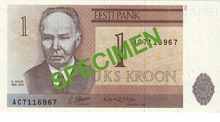1 kroon
The 1 kroon (1 EEK) is the smallest valued banknote of the Estonian kroon, the former currency of Estonia. Kristjan Raud (1865–1943), an Estonian painter, teacher, and cultural historian, is featured with a portrait on the obverse. A view of Toompea Castle in Tallinn appears on the reverse.[1]

Obverse of the 1 krooni bill

Reverse of the 1 krooni bill
The 1 kroon was only issued once and had been steadily going out of circulation since a coin of the same value was also issued. At the time of replacement by the euro, it was very rarely found in use on an everyday basis. It can be exchanged indefinitely at the currency museum of Eesti Pank for €0.06.
History of the banknote
- 1992: first and only series issued by the Bank of Estonia
- 2011: withdrawn from circulation and replaced by the euro
Security features
Source:[2]
- 1992
- On the right-hand side of the banknote is a watermark depicting the Tall Hermann Tower of Toompea Castle.
- The paper of the banknotes contains security fibres of different colour.
- Each note contains a security strip.
- Each banknote has a seven-digit serial number printed in black.
gollark: A minor disadvantage, yes.
gollark: Incident 274792-A5.
gollark: This is... odd. The CSS... works perfectly, in a surprisingly intuitive way.
gollark: Lua has many advantages:- some amount of libraries- cool things like first-class environments, metatables- bindings for most programming languages- performant- exists
gollark: If I do add scripting for some insane reason it'll just be bound Lua or something.
References
- "Estonian banknotes, 1 kroon". Bank of Estonia. Retrieved 2009-04-25.
- "Security features: 1 kroon, 2 krooni". Bank of Estonia. Archived from the original on 2009-04-25. Retrieved 2009-04-10.
External links
| Wikimedia Commons has media related to Money of Estonia. |
This article is issued from Wikipedia. The text is licensed under Creative Commons - Attribution - Sharealike. Additional terms may apply for the media files.